Detailed Description
Time and Virtual Timers related APIs and services.

Functions | |
| static void | vt_set_alarm (systime_t now, sysinterval_t delay) |
| Alarm time setup. | |
| static void | vt_insert_first (virtual_timers_list_t *vtlp, virtual_timer_t *vtp, systime_t now, sysinterval_t delay) |
| Inserts a timer as first element in a delta list. | |
| static void | vt_enqueue (virtual_timers_list_t *vtlp, virtual_timer_t *vtp, sysinterval_t delay) |
| Enqueues a virtual timer in a virtual timers list. | |
| void | chVTDoSetI (virtual_timer_t *vtp, sysinterval_t delay, vtfunc_t vtfunc, void *par) |
| Enables a one-shot virtual timer. | |
| void | chVTDoSetContinuousI (virtual_timer_t *vtp, sysinterval_t delay, vtfunc_t vtfunc, void *par) |
| Enables a continuous virtual timer. | |
| void | chVTDoResetI (virtual_timer_t *vtp) |
| Disables a Virtual Timer. | |
| sysinterval_t | chVTGetRemainingIntervalI (virtual_timer_t *vtp) |
| Returns the remaining time interval before next timer trigger. | |
| void | chVTDoTickI (void) |
| Virtual timers ticker. | |
| systimestamp_t | chVTGetTimeStampI (void) |
| Generates a monotonic time stamp. | |
| void | chVTResetTimeStampI (void) |
| Resets and re-synchronizes the time stamps monotonic counter. | |
| static void | chVTObjectInit (virtual_timer_t *vtp) |
Initializes a virtual_timer_t object. | |
| static systime_t | chVTGetSystemTimeX (void) |
| Current system time. | |
| static systime_t | chVTGetSystemTime (void) |
| Current system time. | |
| static sysinterval_t | chVTTimeElapsedSinceX (systime_t start) |
| Returns the elapsed time since the specified start time. | |
| static bool | chVTIsSystemTimeWithinX (systime_t start, systime_t end) |
| Checks if the current system time is within the specified time window. | |
| static bool | chVTIsSystemTimeWithin (systime_t start, systime_t end) |
| Checks if the current system time is within the specified time window. | |
| static bool | chVTGetTimersStateI (sysinterval_t *timep) |
| Returns the time interval until the next timer event. | |
| static bool | chVTIsArmedI (const virtual_timer_t *vtp) |
Returns true if the specified timer is armed. | |
| static bool | chVTIsArmed (const virtual_timer_t *vtp) |
Returns true if the specified timer is armed. | |
| static void | chVTResetI (virtual_timer_t *vtp) |
| Disables a Virtual Timer. | |
| static void | chVTReset (virtual_timer_t *vtp) |
| Disables a Virtual Timer. | |
| static void | chVTSetI (virtual_timer_t *vtp, sysinterval_t delay, vtfunc_t vtfunc, void *par) |
| Enables a one-shot virtual timer. | |
| static void | chVTSet (virtual_timer_t *vtp, sysinterval_t delay, vtfunc_t vtfunc, void *par) |
| Enables a one-shot virtual timer. | |
| static void | chVTSetContinuousI (virtual_timer_t *vtp, sysinterval_t delay, vtfunc_t vtfunc, void *par) |
| Enables a continuous virtual timer. | |
| static void | chVTSetContinuous (virtual_timer_t *vtp, sysinterval_t delay, vtfunc_t vtfunc, void *par) |
| Enables a continuous virtual timer. | |
| static sysinterval_t | chVTGetReloadIntervalX (virtual_timer_t *vtp) |
| Returns the current reload value. | |
| static void | chVTSetReloadIntervalX (virtual_timer_t *vtp, sysinterval_t reload) |
| Changes a timer reload time interval. | |
| static systimestamp_t | chVTGetTimeStamp (void) |
| Generates a monotonic time stamp. | |
| static void | chVTResetTimeStamp (void) |
| Resets and re-synchronizes the time stamps monotonic counter. | |
| static void | __vt_object_init (virtual_timers_list_t *vtlp) |
| Virtual Timers instance initialization. | |
Function Documentation
◆ vt_set_alarm()
|
static |
Alarm time setup.
- Note
- An RFCU fault is registered if the system time skips past (now + delay), the deadline is skipped forward in order to compensate for the event.
- Parameters
-
[in] now last known system time [in] delay delay over now
Definition at line 69 of file chvt.c.
References CH_CFG_ST_TIMEDELTA, CH_RFCU_VT_INSUFFICIENT_DELTA, chDbgAssert, chRFCUCollectFaultsI(), chTimeAddX, chTimeDiffX, chVTGetSystemTimeX, and likely.
Referenced by chVTDoResetI(), chVTDoTickI(), and vt_enqueue().

◆ vt_insert_first()
|
static |
Inserts a timer as first element in a delta list.
- Note
- This is the special case when the delta list is initially empty.
Definition at line 131 of file chvt.c.
References CH_CFG_ST_TIMEDELTA, ch_dlist_insert_after(), CH_RFCU_VT_INSUFFICIENT_DELTA, chDbgAssert, chRFCUCollectFaultsI(), chTimeAddX, chTimeDiffX, chVTGetSystemTimeX, ch_virtual_timer::dlist, ch_virtual_timers_list::dlist, ch_virtual_timers_list::lasttime, and likely.
Referenced by chVTDoTickI(), and vt_enqueue().

◆ vt_enqueue()
|
static |
Enqueues a virtual timer in a virtual timers list.
Definition at line 205 of file chvt.c.
References ch_dlist_insert(), ch_dlist_isempty(), chTimeDiffX, chVTGetSystemTimeX, ch_virtual_timer::dlist, ch_virtual_timers_list::dlist, ch_virtual_timers_list::lasttime, vt_insert_first(), and vt_set_alarm().
Referenced by chVTDoSetContinuousI(), and chVTDoSetI().
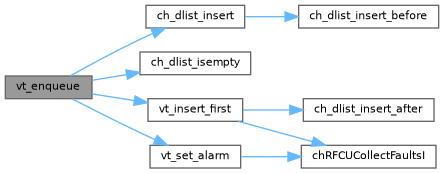
◆ chVTDoSetI()
| void chVTDoSetI | ( | virtual_timer_t * | vtp, |
| sysinterval_t | delay, | ||
| vtfunc_t | vtfunc, | ||
| void * | par ) |
Enables a one-shot virtual timer.
The timer is enabled and programmed to trigger after the delay specified as parameter.
- Precondition
- The timer must not be already armed before calling this function.
- Note
- The callback function is invoked from interrupt context.
- Parameters
-
[out] vtp pointer to a virtual_timer_tstructure[in] delay the number of ticks before the operation timeouts, the special values are handled as follow: - TIME_INFINITE is allowed but interpreted as a normal time specification.
- TIME_IMMEDIATE this value is not allowed.
[in] vtfunc the timer callback function. After invoking the callback the timer is disabled and the structure can be disposed or reused. [in] par a parameter that will be passed to the callback function
- Function Class:
- This is an I-Class API, this function can be invoked from within a system lock zone by both threads and interrupt handlers.
Definition at line 277 of file chvt.c.
References chDbgCheck, chDbgCheckClassI, currcore, ch_virtual_timer::func, ch_virtual_timer::par, ch_virtual_timer::reload, TIME_IMMEDIATE, and vt_enqueue().
Referenced by chSchGoSleepTimeoutS(), and chVTSetI().
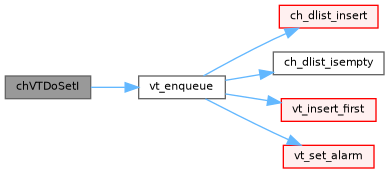
◆ chVTDoSetContinuousI()
| void chVTDoSetContinuousI | ( | virtual_timer_t * | vtp, |
| sysinterval_t | delay, | ||
| vtfunc_t | vtfunc, | ||
| void * | par ) |
Enables a continuous virtual timer.
The timer is enabled and programmed to trigger after the delay specified as parameter.
- Precondition
- The timer must not be already armed before calling this function.
- Note
- The callback function is invoked from interrupt context.
- Parameters
-
[out] vtp pointer to a virtual_timer_tstructure[in] delay the number of ticks before the operation timeouts, the special values are handled as follow: - TIME_INFINITE is allowed but interpreted as a normal time specification.
- TIME_IMMEDIATE this value is not allowed.
[in] vtfunc the timer callback function. After invoking the callback the timer is restarted. [in] par a parameter that will be passed to the callback function
- Function Class:
- This is an I-Class API, this function can be invoked from within a system lock zone by both threads and interrupt handlers.
Definition at line 314 of file chvt.c.
References chDbgCheck, chDbgCheckClassI, currcore, ch_virtual_timer::func, ch_virtual_timer::par, ch_virtual_timer::reload, TIME_IMMEDIATE, and vt_enqueue().
Referenced by chVTSetContinuousI().
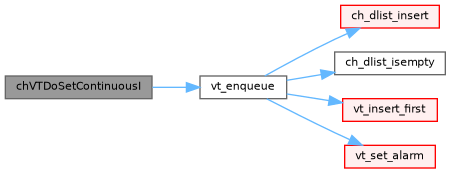
◆ chVTDoResetI()
| void chVTDoResetI | ( | virtual_timer_t * | vtp | ) |
Disables a Virtual Timer.
- Precondition
- The timer must be in armed state before calling this function.
- Parameters
-
[in] vtp pointer to a virtual_timer_tstructure
- Function Class:
- This is an I-Class API, this function can be invoked from within a system lock zone by both threads and interrupt handlers.
Definition at line 338 of file chvt.c.
References ch_dlist_dequeue(), ch_dlist_isempty(), ch_dlist_isfirst(), ch_dlist_remove_first(), chDbgAssert, chDbgCheck, chDbgCheckClassI, chTimeDiffX, chVTGetSystemTimeX, chVTIsArmedI(), currcore, ch_delta_list::delta, ch_virtual_timer::dlist, ch_virtual_timers_list::dlist, ch_virtual_timers_list::lasttime, ch_delta_list::next, and vt_set_alarm().
Referenced by chSchGoSleepTimeoutS(), and chVTResetI().
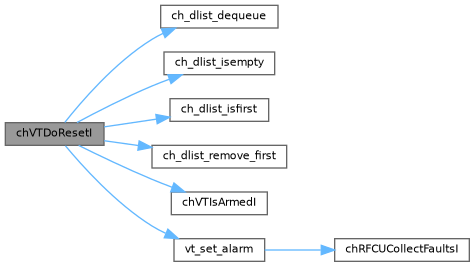
◆ chVTGetRemainingIntervalI()
| sysinterval_t chVTGetRemainingIntervalI | ( | virtual_timer_t * | vtp | ) |
Returns the remaining time interval before next timer trigger.
- Note
- This function can be called while the timer is active.
- Parameters
-
[in] vtp pointer to a virtual_timer_tstructure
- Returns
- The remaining time interval.
- Function Class:
- This is an I-Class API, this function can be invoked from within a system lock zone by both threads and interrupt handlers.
Definition at line 424 of file chvt.c.
References chDbgAssert, chDbgCheckClassI, chTimeDiffX, chVTGetSystemTimeX, currcore, ch_delta_list::delta, ch_virtual_timer::dlist, ch_virtual_timers_list::dlist, ch_virtual_timers_list::lasttime, and ch_delta_list::next.
◆ chVTDoTickI()
| void chVTDoTickI | ( | void | ) |
Virtual timers ticker.
- Note
- The system lock is released before entering the callback and re-acquired immediately after. It is callback's responsibility to acquire the lock if needed. This is done in order to reduce interrupts jitter when many timers are in use.
- Function Class:
- This is an I-Class API, this function can be invoked from within a system lock zone by both threads and interrupt handlers.
Definition at line 464 of file chvt.c.
References ch_dlist_dequeue(), ch_dlist_insert(), ch_dlist_isempty(), ch_dlist_notempty(), CH_RFCU_VT_SKIPPED_DEADLINE, chDbgAssert, chDbgCheckClassI, chRFCUCollectFaultsI(), chSysLockFromISR, chSysUnlockFromISR, chTimeAddX, chTimeDiffX, chVTGetSystemTimeX, currcore, ch_delta_list::delta, ch_virtual_timer::dlist, ch_virtual_timers_list::dlist, ch_virtual_timer::func, ch_virtual_timers_list::lasttime, ch_delta_list::next, ch_virtual_timer::par, ch_virtual_timer::reload, ch_virtual_timers_list::systime, unlikely, vt_insert_first(), and vt_set_alarm().
Referenced by chSysTimerHandlerI().

◆ chVTGetTimeStampI()
| systimestamp_t chVTGetTimeStampI | ( | void | ) |
Generates a monotonic time stamp.
This function generates a monotonic time stamp synchronized with the system time. The time stamp has the same resolution of system time.
- Note
- There is an assumption, this function must be called at least once before the system time wraps back to zero or synchronization is lost. You may use a periodic virtual timer with a very large interval in order to keep time stamps synchronized by calling this function.
- Returns
- The time stamp.
- Function Class:
- This is an I-Class API, this function can be invoked from within a system lock zone by both threads and interrupt handlers.
Definition at line 626 of file chvt.c.
References chDbgAssert, chDbgCheckClassI, chTimeDiffX, chVTGetSystemTimeX, currcore, ch_virtual_timers_list::laststamp, and ch_os_instance::vtlist.
Referenced by chVTGetTimeStamp().
◆ chVTResetTimeStampI()
| void chVTResetTimeStampI | ( | void | ) |
Resets and re-synchronizes the time stamps monotonic counter.
- Function Class:
- This is an I-Class API, this function can be invoked from within a system lock zone by both threads and interrupt handlers.
Definition at line 657 of file chvt.c.
References chDbgCheckClassI, chVTGetSystemTimeX, and currcore.
Referenced by chVTResetTimeStamp().
◆ chVTObjectInit()
|
inlinestatic |
Initializes a virtual_timer_t object.
- Note
- Initializing a timer object is not strictly required because the function
chVTSetI()initializes the object too. This function is only useful if you need to perform achVTIsArmed()check before callingchVTSetI().
- Parameters
-
[out] vtp the virtual_timer_tstructure pointer
- Function Class:
- Object or module nitializer function.
Definition at line 104 of file chvt.h.
References ch_virtual_timer::dlist, and ch_delta_list::next.
◆ chVTGetSystemTimeX()
|
inlinestatic |
Current system time.
Returns the number of system ticks since the chSysInit() invocation.
- Note
- The counter can reach its maximum and then restart from zero.
-
This function can be called from any context but its atomicity is not guaranteed on architectures whose word size is less than
systime_tsize.
- Returns
- The system time in ticks.
- Function Class:
- This is an X-Class API, this function can be invoked from any context.
Definition at line 122 of file chvt.h.
References currcore.
Referenced by __vt_object_init(), chVTGetSystemTime(), chVTIsSystemTimeWithinX(), and chVTTimeElapsedSinceX().
◆ chVTGetSystemTime()
|
inlinestatic |
Current system time.
Returns the number of system ticks since the chSysInit() invocation.
- Note
- The counter can reach its maximum and then restart from zero.
- Returns
- The system time in ticks.
- Function Class:
- Normal API, this function can be invoked by regular system threads but not from within a lock zone.
Definition at line 141 of file chvt.h.
References chSysLock, chSysUnlock, and chVTGetSystemTimeX().
Referenced by chVTIsSystemTimeWithin().

◆ chVTTimeElapsedSinceX()
|
inlinestatic |
Returns the elapsed time since the specified start time.
- Parameters
-
[in] start start time
- Returns
- The elapsed time.
- Function Class:
- This is an X-Class API, this function can be invoked from any context.
Definition at line 159 of file chvt.h.
References chTimeDiffX, and chVTGetSystemTimeX().

◆ chVTIsSystemTimeWithinX()
Checks if the current system time is within the specified time window.
- Note
- When start==end then the function returns always false because the time window has zero size.
- Parameters
-
[in] start the start of the time window (inclusive) [in] end the end of the time window (non inclusive)
- Return values
-
true current time within the specified time window. false current time not within the specified time window.
- Function Class:
- This is an X-Class API, this function can be invoked from any context.
Definition at line 177 of file chvt.h.
References chTimeIsInRangeX(), and chVTGetSystemTimeX().

◆ chVTIsSystemTimeWithin()
Checks if the current system time is within the specified time window.
- Note
- When start==end then the function returns always false because the time window has zero size.
- Parameters
-
[in] start the start of the time window (inclusive) [in] end the end of the time window (non inclusive)
- Return values
-
true current time within the specified time window. false current time not within the specified time window.
- Function Class:
- Normal API, this function can be invoked by regular system threads but not from within a lock zone.
Definition at line 195 of file chvt.h.
References chTimeIsInRangeX(), and chVTGetSystemTime().

◆ chVTGetTimersStateI()
|
inlinestatic |
Returns the time interval until the next timer event.
- Note
- The return value is not perfectly accurate and can report values in excess of
CH_CFG_ST_TIMEDELTAticks. - The interval returned by this function is only meaningful if more timers are not added to the list until the returned time.
- Parameters
-
[out] timep pointer to a variable that will contain the time interval until the next timer elapses. This pointer can be NULLif the information is not required.
- Returns
- The time, in ticks, until next time event.
- Return values
-
false if the timers list is empty. true if the timers list contains at least one timer.
- Function Class:
- This is an I-Class API, this function can be invoked from within a system lock zone by both threads and interrupt handlers.
Definition at line 216 of file chvt.h.
References CH_CFG_ST_TIMEDELTA, chDbgCheckClassI, chTimeDiffX, chVTGetSystemTimeX, currcore, ch_delta_list::delta, ch_virtual_timers_list::dlist, ch_virtual_timers_list::lasttime, and ch_delta_list::next.
◆ chVTIsArmedI()
|
inlinestatic |
Returns true if the specified timer is armed.
- Precondition
- The timer must have been initialized using
chVTObjectInit()orchVTDoSetI().
- Parameters
-
[in] vtp the virtual_timer_tstructure pointer
- Returns
- true if the timer is armed.
- Function Class:
- This is an I-Class API, this function can be invoked from within a system lock zone by both threads and interrupt handlers.
Definition at line 248 of file chvt.h.
References chDbgCheckClassI, ch_virtual_timer::dlist, and ch_delta_list::next.
Referenced by chSchGoSleepTimeoutS(), chVTDoResetI(), chVTIsArmed(), and chVTResetI().
◆ chVTIsArmed()
|
inlinestatic |
Returns true if the specified timer is armed.
- Precondition
- The timer must have been initialized using
chVTObjectInit()orchVTDoSetI().
- Parameters
-
[in] vtp the virtual_timer_tstructure pointer
- Returns
- true if the timer is armed.
- Function Class:
- Normal API, this function can be invoked by regular system threads but not from within a lock zone.
Definition at line 265 of file chvt.h.
References chSysLock, chSysUnlock, and chVTIsArmedI().

◆ chVTResetI()
|
inlinestatic |
Disables a Virtual Timer.
- Note
- The timer is first checked and disabled only if armed.
- Precondition
- The timer must have been initialized using
chVTObjectInit()orchVTDoSetI().
- Parameters
-
[in] vtp the virtual_timer_tstructure pointer
- Function Class:
- This is an I-Class API, this function can be invoked from within a system lock zone by both threads and interrupt handlers.
Definition at line 285 of file chvt.h.
References chVTDoResetI(), and chVTIsArmedI().
Referenced by chVTReset(), chVTSetContinuousI(), and chVTSetI().
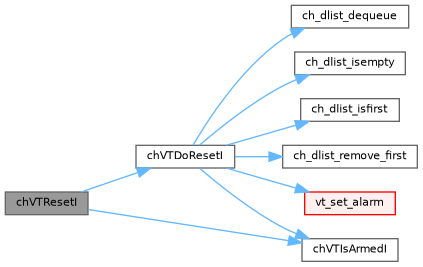
◆ chVTReset()
|
inlinestatic |
Disables a Virtual Timer.
- Note
- The timer is first checked and disabled only if armed.
- Precondition
- The timer must have been initialized using
chVTObjectInit()orchVTDoSetI().
- Parameters
-
[in] vtp the virtual_timer_tstructure pointer
- Function Class:
- Normal API, this function can be invoked by regular system threads but not from within a lock zone.
Definition at line 302 of file chvt.h.
References chSysLock, chSysUnlock, and chVTResetI().

◆ chVTSetI()
|
inlinestatic |
Enables a one-shot virtual timer.
If the virtual timer was already enabled then it is re-enabled using the new parameters.
- Precondition
- The timer must have been initialized using
chVTObjectInit()orchVTDoSetI().
- Parameters
-
[in] vtp the virtual_timer_tstructure pointer[in] delay the number of ticks before the operation timeouts, the special values are handled as follow: - TIME_INFINITE is allowed but interpreted as a normal time specification.
- TIME_IMMEDIATE this value is not allowed.
[in] vtfunc the timer callback function. After invoking the callback the timer is disabled and the structure can be disposed or reused. [in] par a parameter that will be passed to the callback function
- Function Class:
- This is an I-Class API, this function can be invoked from within a system lock zone by both threads and interrupt handlers.
Definition at line 331 of file chvt.h.
References chVTDoSetI(), and chVTResetI().
Referenced by chVTSet().

◆ chVTSet()
|
inlinestatic |
Enables a one-shot virtual timer.
If the virtual timer was already enabled then it is re-enabled using the new parameters.
- Precondition
- The timer must have been initialized using
chVTObjectInit()orchVTDoSetI().
- Parameters
-
[in] vtp the virtual_timer_tstructure pointer[in] delay the number of ticks before the operation timeouts, the special values are handled as follow: - TIME_INFINITE is allowed but interpreted as a normal time specification.
- TIME_IMMEDIATE this value is not allowed.
[in] vtfunc the timer callback function. After invoking the callback the timer is disabled and the structure can be disposed or reused. [in] par a parameter that will be passed to the callback function
- Function Class:
- Normal API, this function can be invoked by regular system threads but not from within a lock zone.
Definition at line 360 of file chvt.h.
References chSysLock, chSysUnlock, and chVTSetI().

◆ chVTSetContinuousI()
|
inlinestatic |
Enables a continuous virtual timer.
If the virtual timer was already enabled then it is re-enabled using the new parameters.
- Precondition
- The timer must have been initialized using
chVTObjectInit()orchVTDoSetI().
- Parameters
-
[in] vtp the virtual_timer_tstructure pointer[in] delay the number of ticks before the operation timeouts, the special values are handled as follow: - TIME_INFINITE is allowed but interpreted as a normal time specification.
- TIME_IMMEDIATE this value is not allowed.
[in] vtfunc the timer callback function. After invoking the callback the timer is disabled and the structure can be disposed or reused. [in] par a parameter that will be passed to the callback function
- Function Class:
- This is an I-Class API, this function can be invoked from within a system lock zone by both threads and interrupt handlers.
Definition at line 390 of file chvt.h.
References chVTDoSetContinuousI(), and chVTResetI().
Referenced by chVTSetContinuous().

◆ chVTSetContinuous()
|
inlinestatic |
Enables a continuous virtual timer.
If the virtual timer was already enabled then it is re-enabled using the new parameters.
- Precondition
- The timer must have been initialized using
chVTObjectInit()orchVTDoSetI().
- Parameters
-
[in] vtp the virtual_timer_tstructure pointer[in] delay the number of ticks before the operation timeouts, the special values are handled as follow: - TIME_INFINITE is allowed but interpreted as a normal time specification.
- TIME_IMMEDIATE this value is not allowed.
[in] vtfunc the timer callback function. After invoking the callback the timer is disabled and the structure can be disposed or reused. [in] par a parameter that will be passed to the callback function
- Function Class:
- Normal API, this function can be invoked by regular system threads but not from within a lock zone.
Definition at line 419 of file chvt.h.
References chSysLock, chSysUnlock, and chVTSetContinuousI().

◆ chVTGetReloadIntervalX()
|
inlinestatic |
Returns the current reload value.
- Parameters
-
[in] vtp the virtual_timer_tstructure pointer
- Returns
- The reload value.
- Function Class:
- This is an X-Class API, this function can be invoked from any context.
Definition at line 435 of file chvt.h.
References ch_virtual_timer::reload.
◆ chVTSetReloadIntervalX()
|
inlinestatic |
Changes a timer reload time interval.
- Note
- This function is meant to be called from a timer callback, it does nothing in any other context.
- Calling this function from a one-shot timer callback turns it into a continuous timer.
- Parameters
-
[in] vtp the virtual_timer_tstructure pointer[in] reload the new reload value, zero means no reload
- Function Class:
- This is an X-Class API, this function can be invoked from any context.
Definition at line 452 of file chvt.h.
References ch_virtual_timer::reload.
◆ chVTGetTimeStamp()
|
inlinestatic |
Generates a monotonic time stamp.
This function generates a monotonic time stamp synchronized with the system time. The time stamp has the same resolution of system time.
- Note
- There is an assumption, this function must be called at least once before the system time wraps back to zero or synchronization is lost. You may use a periodic virtual timer with a very large interval in order to keep time stamps synchronized by calling this function.
- Returns
- The time stamp.
- Function Class:
- Normal API, this function can be invoked by regular system threads but not from within a lock zone.
Definition at line 474 of file chvt.h.
References chSysLock, chSysUnlock, and chVTGetTimeStampI().

◆ chVTResetTimeStamp()
|
inlinestatic |
Resets and re-synchronizes the time stamps monotonic counter.
- Function Class:
- Normal API, this function can be invoked by regular system threads but not from within a lock zone.
Definition at line 491 of file chvt.h.
References chSysLock, chSysUnlock, and chVTResetTimeStampI().

◆ __vt_object_init()
|
inlinestatic |
Virtual Timers instance initialization.
- Note
- Internal use only.
- Parameters
-
[out] vtlp pointer to the virtual_timers_list_tstructure
- Function Class:
- Not an API, this function is for internal use only.
Definition at line 509 of file chvt.h.
References ch_dlist_init(), chVTGetSystemTimeX(), ch_virtual_timers_list::dlist, ch_virtual_timers_list::laststamp, ch_virtual_timers_list::lasttime, and ch_virtual_timers_list::systime.
Referenced by chInstanceObjectInit().
